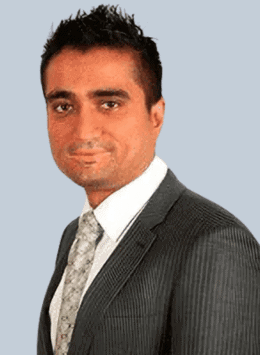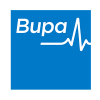London Skin Cancer Clinic
Home » Treatments » London Skin Cancer Clinic
Empowering Skin Cancer Care Solutions
Not sure about your condition? Get in touch now, there is no reason for you to wait.
Award winning dermatology service, with over 20 years of experience
Short waiting lists, on some occasions offering same week appointments
Safe environment, in Care Quality Commission approved facilities
London Skin Cancer Clinic
Skin cancer is the commonest form of cancer affecting people in the U.K. and indeed, throughout the world. The commonest varieties, basal cell carcinoma and squamous cell carcinoma are known as non-melanoma skin cancers whilst the third commonest type is malignant melanoma.
People with paler skins present a higher risk of developing skin cancer as they are more vulnerable to damage from the sun’s ultraviolet (UV) rays. Exposure to sunlight is often a major factor in the development of skin cancer, and the number of cases in the U.K. is on the rise, despite highly publicised warnings against excessive tanning.
HOW IS SKIN CANCER TREATED?
SKIN CANCER CONDITIONS WE TREAT:
MOHS SURGERY
Mohs surgery is an effective skin cancer treatment, most commonly used to treat basal cell carcinomas (BCCs) and squamous cell carcinomas (SCCs). The Mohs procedure works by removing the tumor gradually in small layers and examining the tissue until all the cancerous cells have been removed. This precise removal technique leaves as much healthy tissue as possible.
SURGICAL EXCISION
Small skin cancers can be removed by excision surgery. This surgery involves cutting out the cancerous cells as well as an area of healthy skin around it. This area of healthy skin is checked to ensure all the cancerous tissue has been removed. The surgery is likely to be carried out using local anesthetic and a skin graft may be needed depending on the amount of skin removed.
CURETTAGE AND ELECTROCAUTERY
For small skin cancers, curettage and electrocautery can be used as treatment. This involves using a small blade to scrape the cancer from the body and then using heat or electricity to remove any remaining cancer cells and to stop any bleeding.
PHOTODYNAMIC THERAPY
Photodynamic Therapy (PTD) is a simple, non-invasive procedure that can be used to treat precancerous skin lesions. The treatment uses topical cream and light therapy to destroy cancerous and precancerous cells but doesn’t affect healthy tissue. Traditional photodynamic therapy uses artificial light as the light source, but this treatment can also take the form of daylight photodynamic therapy where natural sunlight is used.
CRYOTHERAPY
Cryotherapy, also called cryosurgery is a skin cancer treatment which uses liquid nitrogen to freeze and destroy cancerous cells. This treatment works when the cancer is small and only affects the upper layers of the skin. The liquid nitrogen is sprayed onto the cancerous cells and a scab is formed, about two weeks later the scab will fall off along with the cancerous cells. You may need a couple of treatments to fully remove the cancerous cells.
TOPICAL CHEMOTHERAPY
A chemotherapy cream can be applied directly to the skin to treat non-melanoma skin cancers which are contained in the top layer of the skin. This treatment is applied by the patient and so can be done from home with instruction from a doctor. The cream is applied daily for around 3-4 weeks depending on the location and severity of the lesion and will make the skin sore and inflamed. The cream will have destroyed the cancerous cells and the skin is then left to heal. As only the surface of the skin is affected, you won’t experience the side effects associated with other forms of chemotherapy, such as vomiting or hair loss, however, your skin may feel sore for several weeks afterwards.
FREQUENTLY ASKED QUESTIONS
CAN THERE BE ANY COMPLICATIONS OR RISKS TO SKIN CANCER TREATMENT?
All procedures do come with an element of risk. These risks are usually very small but it is important you are aware of them.
Bleeding, Bruising or Infection – Any wound is at risk from bleeding, bruising, infection or breakdown after surgery. After your procedure you will be given a leaflet which explains how to avoid these complications. If you follow the wound care instructions following your surgery, these problems are uncommon.
Pain or discomfort – You may experience some pain when the local anesthetic is being injected, and once this wears off, the area may feel sore.
Scarring – Depending on the procedure, you may be left with a scar. Sometimes a keloid scar develops (this is a raised, lumpy, hard or rubbery scar). If this is a concern, the doctor can discuss this with you in more detail.
Further Surgery – Some conditions may require further surgery at a later date, depending on what is found. In addition, some conditions do have the risk of recurring in the future.
Nerve damage – In very rare cases, or at high risk sites, there may be a very small risk of nerve damage to the nerves running in the area to be operated on. Again, this is not relevant to all procedures, and can be discussed in further detail with your consultant.
If you have had an adverse reaction to a local anaesthetic before (e.g. for dental treatment) it is important to inform your consultant. Your expert dermatologist will cover all these questions, risks and any issues in your consultation before you consent to surgery.
HOW DO I PREPARE FOR DERMATOLOGICAL SURGERY?
We advise that you bring someone with you when you attend for surgery.
If you are having a procedure on your hands or feet or around your eyes, it would be advisable to ensure you have someone to help you get home.
There are a series of medications which require more complex advice, these will be discussed at your consultation.
Please inform the theatre nurse, before your surgery, if you have previously experienced any adverse events to any procedures, including fainting episodes.
WHAT WILL HAPPEN DURING MY SKIN CANCER SURGERY?
The procedure will be undertaken in one of the operating theatres in our clinics.
On arrival, please book in at the reception desk.
A theatre nurse will take you to the theatre when ready. A doctor will discuss the procedure with you and answer any further questions you may have.
Following your procedure, wound care instructions will be given to. Once the procedure is finished you will be asked to stay in the clinic for 30 minutes to ensure you have recovered sufficiently. You are also advised to refrain from driving until the following day.
The recovery period is 24 to 48 hours after surgery. Please be aware that in the days following the procedure you should arrange to take a few days off work and/or ask someone to help you at home if necessary. You should not be performing any strenuous activities (this includes lifting, exercise and housework). It is important that you should not get the wound wet for 48 hours following the procedure, so please ensure your skin is clean before attending.
WHAT ARE THE TYPES OF SKIN CANCER SURGERY?
Cryosurgery
Cryosurgery can be used to treat benign surface lesions, sun damage and is occasionally used for the treatment of some forms of skin cancer. Liquid Nitrogen is applied to the skin either with a cotton applicator or via a pressurised spray to freeze the surface layers.
After treatment there is a local inflammatory reaction. With a short freeze there is some discomfort then the site swells slightly and feels like a burn before settling after a few hours and the surface layers then peel over a few days. An intense treatment is painful and may require local anaesthesia. A blister will form which may require regular dressings whilst it heals over 10-14 days.
Electrosurgery
High frequency ultrasound is applied to the surface of the skin via a small electrode to heat the surface layers. This treatment may be used alone for benign surface lesions or in combination with curettage to remove a variety of lesions from small keratoses to some forms of skin cancer. Topical or local anaesthesia are usually required. There is a surface wound which requires regular wound care whilst it heals.
Excision
Formally excising a lesion is often the most appropriate procedure depending on the likely pathology. Local anaesthesia is required and usually the wound is repaired with sutures. Sometimes the sutures are buried and are absorbed over a few weeks or surface sutures may be used which require removal after a number of days depending on the site and size of the wound.
The wound may be left to heal naturally and require regular dressings, but this option is fully explained at the time.
Local Flaps and Grafts
Occasionally a lesion may be of a size or in a site where the best functional and/or cosmetic outcome will be achieved by the use of a local skin flap or a skin graft. We use these techniques commonly and if it may be relevant to your care then the options will be discussed fully with you at your consultation.
Mohs’ surgery
Mohs’ micrographic surgery is considered the most effective technique for treating many basal cell carcinomas (BCCs) and squamous cell carcinomas (SCCs), the two most common types of skin cancer. The procedure is done in stages, including lab work, while the patient waits. This allows the removal of all cancerous cells for the highest cure rate while sparing healthy tissue and leaving the smallest possible scar.
IS SKIN CANCER HEREDITARY?
Skin cancer is not hereditary in the sense that it is passed down through a gene. However, skin type does run in families so those more likely to develop skin cancer are often in the same family.
WHO IS MOST AT RISK OF GETTING SKIN CANCER?
Men are more likely than women to develop skin cancer and it is more common in the elderly.
WHAT FACTOR SUN CREAM SHOULD I USE?
It is recommended to use a high factor of sunscreen no matter your skin type. SPF30 with a 4-star UVA rating during the summer is recommended for those with paler skin to stop burning but also to help prevent wrinkles and sunspots in those who don’t burn as easily.
DO SUNBEDS CAUSE SKIN CANCER?
Research shows sun beds are a significant risk factor in skin cancer.
HOW CAN I PREVENT DEVELOPING SKIN CANCER?
Protecting your skin is, of course, always the best course of action. The easiest ways you can do this include:
- Wearing a waterproof, high level of SPF protection when in the sun
- Use a daily moisturiser with SPF protection
- Avoid the sun when it is at its strongest during the day
- Wear a hat when in the sun
- Sit in the shade
HEAR FROM OUR PATIENTS
Start Your Journey With Us
Please fill in this form and one of our team will give you a call back to arrange a consultation with one of our expert dermatologists.
WHY TREAT YOUR SKIN CANCER AT STRATUM DERMATOLOGY CLINICS?
Having the right dermatologist is important especially when you have a chronic skin condition that will require ongoing treatment. We want you to feel confident that we’re providing you with the best possible care. We also want you to feel as comfortable as possible with your dermatologist.
The Harley Street Dermatology Clinic specialises in conditions affecting the skin, hair and nails. Our goal is to provide all the care that you need when you’re experiencing these kinds of problems. We want to make it easy for you to access the best quality treatment and support in London.
Our London skin cancer clinic is conveniently located in Central London, so it’s easy to visit us if you need to see a dermatologist. You will find yourself in a very comfortable and welcoming environment. We have created a relaxing space where you will receive the highest quality of care. We are regulated by the Care Quality Commission, are part of the British Association of Dermatologists and are top rated by patients of Doctify so you can be sure of safe and effective treatment with us.
Skin Cancer Treatment Process:
Book Assessment
Contact us to arrange a no-obligation consultation with our experienced specialist who will examine and discuss your stage of your skin cancer.
Appropriate Treatment Identified
There are a wide range of treatment options available depending on the severity and location of your skin cancer. Our experienced dermatologist will explain all of your treatment options and help you to decide the best programme for you.
Treatment Begins
Once an appropriate treatment has been agreed upon, the treatment programme begins, and you’ll be well on your way to a healthier, happier skin. Results will likely appear within the timeframe suggested by your acne specialist.
Skin Cancer INSIGHTS AND ADVICE
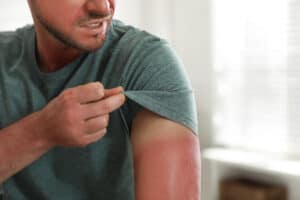
Ask The Expert: Sun Damage
WHAT DO I DO IF I BURN MY SKIN? Ideally, with the right high SPF sun cream and caution, sunburn can be avoided completely. However, in cases where sunburn happens, it is important to begin treating as soon as possible and get out of the
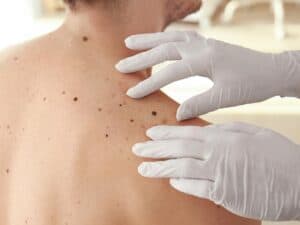
Worried about a mole?
A mole is a coloured spot on the skin which is made up of a cluster of cells known as melanocytes which are responsible for producing the pigment in your skin. Sometimes these melanocytes grow in a cluster instead of being spread out which results
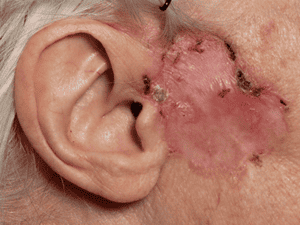
Is BCC (Basal Cell Carcinoma) a Completely Curable Disease? How?
You might not have heard of Basal Cell Carcinoma before, but it is actually the most common form of skin cancer in the UK. About 80% of the people who are diagnosed with skin cancer every year have a BCC. If you are diagnosed with



